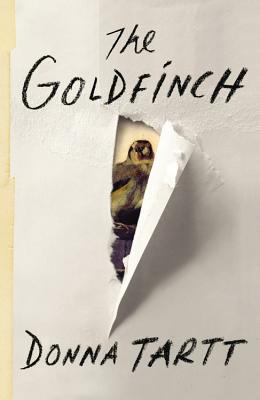The Goldfinch

Summary (from the publisher): It begins with a boy. Theo Decker, a thirteen-year-old New Yorker, miraculously survives an accident that kills his mother. Abandoned by his father, Theo is taken in by the family of a wealthy friend. Bewildered by his strange new home on Park Avenue, disturbed by schoolmates who don't know how to talk to him, and tormented above all by his unbearable longing for his mother, he clings to one thing that reminds him of her: a small, mysteriously captivating painting that ultimately draws Theo into the underworld of art.
As an adult, Theo moves silkily between the drawing rooms of the rich and the dusty labyrinth of an antiques store where he works. He is alienated and in love-and at the center of a narrowing, ever more dangerous circle.
The Goldfinch is a novel of shocking narrative energy and power. It combines unforgettably vivid characters, mesmerizing language, and breathtaking suspense, while plumbing with a philosopher's calm the deepest mysteries of love, identity, and art. It is a beautiful, stay-up-all-night and tell-all-your-friends triumph, an old-fashioned story of loss and obsession, survival and self-invention, and the ruthless machinations of fate.
As an adult, Theo moves silkily between the drawing rooms of the rich and the dusty labyrinth of an antiques store where he works. He is alienated and in love-and at the center of a narrowing, ever more dangerous circle.
The Goldfinch is a novel of shocking narrative energy and power. It combines unforgettably vivid characters, mesmerizing language, and breathtaking suspense, while plumbing with a philosopher's calm the deepest mysteries of love, identity, and art. It is a beautiful, stay-up-all-night and tell-all-your-friends triumph, an old-fashioned story of loss and obsession, survival and self-invention, and the ruthless machinations of fate.
Review: The Goldfinch is narrated by Theo Decker. At the age of thirteen, Theo's mother dies in an explosion, forever altering the path that Theo's life will take. He lives for a while with a wealthy friend on Park Avenue, before his father appears to cart him off to a life of gambling, drugs, and neglect in Las Vegas. Later, Theo returns to New York, where his new guardian introduces him to the world of antiques. Through it all, Theo is hiding the dark secret of a painting, a "priceless" work of art that has fallen into Theo's hands.
Donna Tartt is a master of detail. Her rich descriptions allow her to paint such a distinct picture of the characters within her novel. Even the most minor characters, only seen for a few pages, are given a depth and complexity that give them life. For example, Theo describes a fellow classmate, saying, "Saffi Caspersen, who was Danish, spoke English with a high-toned British accent, had a minor role in a Cirque du Soleil production, and was by leaps and bounds the most beautiful girl in our year. Saffi was in Honors English with us (where she'd had some interesting things to say about The Heart is a Lonely Hunter)" (296).
Furthermore, Tartt is particularly adept at creating her novel's setting. As a reader, I felt so clearly how much I was in New York City in the opening chapter of the books; "The leaves were just coming out on the trees. Delivery boys from D'Agostino's and Gristede's pushed carts laden with groceries; harried executive women in heels plunged down the sidewalk, dragging reluctant kindergartners behind them; a uniformed worker swept debris from the gutter into a dustpan on a stick; lawyers and stockbrokers held their palms out and knit their brows as they looked up at the sky" (13). Later, when Theo is in Las Vegas, the difference is tangible - the sand, the heat, the miles of suburbs are palpably different from the life of New York.
Like other readers, my favorite part of this novel was the beginning. Increasingly as the novel progressed, the plot seemed to veer wildly and the novel moved from being the story of a grieving boy to one of an immoral and drug addicted man. I was also taken aback when, after hundreds of pages of dense detail, the novel abruptly moves forward in time eight years. Most difficult for me was my increasing disappointment and even dislike for the adult Theo. As a boy, Theo is innocent and kind. He identifies with his hard-working mother, is an excellent student, looks out for his bullied and nerdy friend Andy. As an adult, Theo has become a liar and a cheat with few redeeming qualities. Despite his rather disastrous teenage years, it was hard to accept that his character could change so much.
One disturbing theme running throughout this novel was an overabundance of missing and dead parents. Theo's parents both die, Boris's mother is dead and his father basically out of the picture, Andy's parents are largely absent (and his father later dies), and both of Pippa's parents are dead. Furthermore, many die tragically through freak accidents: explosions, car crashes, hypothermia. This is the novel of orphans trying to swim to adulthood without a guide.
For Theo, "life is catastrophe" (767). He says, "And if I could go back in time I'd clip the chain in a heartbeat and never care a minute that the picture was never painted" (765). Theo would free the goldfinch from captivity and hardship, no matter the cost, because after a childhood characterized by loss, he knows all too well the price of a life lived against your will and without freedom.
Although too long at times, with a high action ending that seemed difficult to believe, Tartt's vivid writing style and striking characters made this read worth the nearly eight hundred pages.
Stars: 4


Comments
Post a Comment